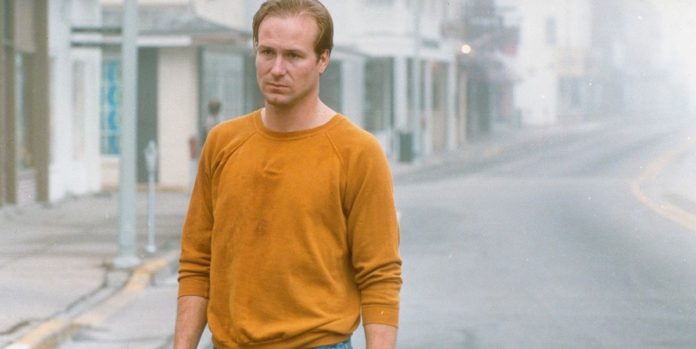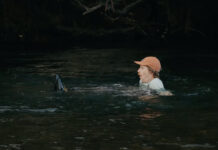This article originally appeared in the October 1986 issue of Esquire. You can find every Esquire story ever published at Esquire Classic.
“Look, I’m not a talented man,” says William Hurt. “You know it and I know it.”
“I don’t know it,” I say.
“Well, you should know it,” says Hurt.
“You’re not a talented man?” I press him.
“Well, I’m not that talented a man,” he says.
“Well then, what are you?” I ask.
“I’m a focused man,” he says.
We are sitting in an Italian restaurant on New York’s Upper East Side, and Bill Hurt is engaged in one of his favorite pastimes—putting himself down. Few who have seen him act would agree with his estimate of his ability. And as for being “focused,” well, that’s the last word many people would use to describe Hurt. The actor is a walking paradox: the owner of one of the cleanest, clearest, least self-indulgent acting styles in the business, Hurt is legendary for the far-out, labyrinthine, metaphysical flights of fancy that have driven interviewers on several continents into a state of mumbling meemies. WILLIAM HURT: ACTOR WITH THE ATOM BRAIN! blazed a headline in one English magazine. Another interviewer succinctly summed up the experience of listening to Hurt: “He sounds like a man who has just smoked his first joint.”
Some of this Hurt-shock can be explained by reporters’ preference for crunchy, flash-frozen quotes. Hurt can come up with those. Responding to a question about nude scenes in his first film, Altered States, Hurt said: “All scenes are love scenes and all scenes are naked.” He has referred to Hollywood as “a Tower of Baubles.” Defining theater as a ritual, he has said, “I would like to supplant the ritual of war with the ritual of the imagination.” But normally, his discourse is a plunge into thickets of abstraction. One of his mottoes is “I believe in what I don’t know more than what I know.”
It’s Hurt’s reckless romance with the unknown that flabbergasts his interlocutors. In the first conversation I ever had with him, five years ago, he said, with startling passion: “The central metaphor of my life is a circle and a center, and the accompanying knowledge that the circle is the circle, the center is the center, but they are not the same.” This is the kind of divagation that can strike terror to the heart of Hurt’s listener. A few years ago Hurt was delivering a tribute to Burt Lancaster at the New York Film Critics’ awards. Lancaster, seated at a table, fixed Hurt with a grateful smile that slowly froze into a rictus of appalled bafflement as Hurt’s homage became a runaway train of celebratory rhetoric.
If you listen to Hurt with your ears open, you find a volcanic sincerity, a fierce desire to cut through the usual actor’s jargon to a more universal truth. He passionately hates easy answers, and in a way for him all answers are too easy. Hurt also hates interviews, but unlike many actors who hate them, he will not be evasive, coy, or condescending. He won’t slather you with fake charm while contempt glitters in his eyes.
As his friend Sigourney Weaver has said: “What I respect about Bill is that he’s not afraid to sound like an asshole.” Hurt called my attention to Weaver’s statement with amused pride; he’d rather be called a thinking-man’s asshole than be told what a great actor he is.
So here he is, in this pleasant Italian restaurant on Manhattan’s East Side, looking, as usual, incandescently nondescript: six-feet-two frame slumped in an off-the-rack preppie shirt, blond hair lank and casual, blue eyes calm behind those now-famous wire frames. “I’m not a great actor,” he insists again. “But I have a great quality. I respect others. No one can look me in the face and say I’m as good as Streep, Scott, or Duvall. The greatest thing is to be nominated for Best Supporting Actor. If you’re not supporting something, what are you doing up there?”
He pours himself another glass of wine. With Hurt, the mixture of wine and words can be a flammable compound. Fueled up, he launches into a salvo of Shakespeare quotations, blasting off into golden oldies from Richard II, Romeo and Juliet, and King John. The latter, the most interesting, is the great speech by the Bastard on “commodity,” a term that Hurt is clearly applying to actors. Ignoring his cooling cannelloni, his eyes riveted to his listener’s, his voice low but filled with power and music, Hurt delivers the entire speech, rising to the ironic climax: “Since kings break faith upon commodity,/Gain be my lord, for I will worship thee.”
Hurt is no worshiper of gain. His asking price is in the seven-figure class now, but he took little more than expenses, and a percentage in the risky profits, to star in Kiss of the Spider Woman. He plays Molina, the imprisoned homosexual window dresser who teaches his cellmate, Valentin (Raul Julia), the macho revolutionary, something about commitment and love. The performance won him the 1985 Academy Award for Best Actor. Characteristically, Hurt insists that he won the Oscar not for his talent but for his “ethics”; for bringing dignity and compassion to his portrait of a victim of an oppressive regime. “I’ve reversed the typical growth pattern,” says Hurt. “I’ve become an ethical person before becoming a fine actor. Humanity is greater than art.”
A few weeks before, at his West Side apartment, Hurt’s vivid account of the making of Kiss of the Spider Woman in Brazil with director Hector Babenco had given a dramatic glimpse of his working method, his personality, and the moral energy he hurls into every performance. “What I really wanted to do with Molina was much broader than what I did,” said Hurt. “I wanted to play him almost as a kind of Medea, with a torrent of grotesque anger. I wanted him to fling those ugly stereotypes about homosexuals right back in people’s faces.” Leaping to his feet, Hurt proceeded to undulate with the absurd grace of an androgynous giraffe, and spat out in the kicked-bitch tones of Molina: “‘All right, this is what you think I am, so this is what I will be.’ But it scared the shit out of everybody. Hector said, ‘I just can’t go with that.’”
Accepting a “quieter” interpretation of Molina, Hurt had started rehearsals with Raul Julia. But things were going very badly. “We were up against a wall,” recalled Hurt. “One day Hector had to go off to a meeting, but I said, ‘We’re not getting through, we’ve got to keep going.’ I asked Hector if we could rehearse without him. He said yes. I told Raul, ‘Let’s just lie down and do whatever we want.’ We weren’t getting anywhere; it was a mess, we felt icky.
“So I said, ‘Okay, let’s just switch roles.’ It’s tricky; you have to trust the other person, because when he plays your role he’s gonna be telling you how you should play it, and you don’t like being told what to do. So I told Raul we could pull the plug on this anytime either one of us felt threatened. Well, we just flew. Raul was the one who took off first. I was dazzled by his flamboyance, his freedom of movement, his charm and love and sensuality. So I took up the gauntlet, and I made that revolutionary one tough son of a bitch. I took it right to him—‘You make me sick when I look at you!’ And I started to fly because we were giving each other what we needed from each other.”
Exulting in the breakthrough, Hurt went racing to find Babenco. “‘Look,’ I said, ‘no one has seen this movie. Maybe no one ever will. We’ve tried me playing Molina, Raul playing the macho guy. It’s not gonna work that way. So let’s switch.’ Hector said no, ‘No way.’ Thank God! So we went back and played. This time we had so much more information, we were so much more giving to each other. We understood the dimensions of the characters so much better. It takes generosity to do that. I don’t know if I have it, but I know that Raul does.”
When he accepted his Oscar, Hurt announced he shared the award with Julia. It was the high point of a still young career, but Hurt almost didn’t experience it. He didn’t want to attend the Academy Award show; actors, he felt, don’t compete with one another. “I was getting really self-righteous,” he said. “But in reality I was afraid—the most typical forms of fear are self-righteousness and boredom. It was Steve Spielberg who set me straight. He told me it was a big deal and I should go. So I was able to defuse that demon and enjoy it for what it is. If people are going to honor you, how dare you not accept that?”
Bill Hurt’s early life featured wide, disruptive swings—from the South Pacific, where his father worked for the State Department, to a small Manhattan apartment with his mother after his parents were divorced, to a twenty-two-room apartment when his mother married Henry Luce III, son of the founder of Time, Inc. He majored in theology for his first three years at Tufts University in Massachusetts before switching to theater, deciding that “religion does not represent humanity anymore.” Hurt now thinks that he went into theology because “I was trying to earn my stepfather’s love. He was a highly religious man.” There were other loves. He married the young actress, Mary Beth Hurt, and went into acting, facing the choice between training in America or England. He chose America because, as he put it, “I preferred the passion that seeks the form rather than the form that seeks the passion.” After two years’ study at New York’s Juilliard School, passion and form got entangled: Hurt chafed under the school’s discipline, his marriage grew shaky (he is now divorced), and his mother died. Hopping on a motorcycle, Hurt traveled all the way to the Shakespeare Festival in Ashland, Oregon, where he played Edmund in Eugene O’Neill’s Long Day’s Journey into Night. “I have no compunction about saying I was the best Edmund there ever was,” he declares, putting aside his usual humility.
Since then he has put together a string of performances that for superb quality and consistency are rivaled only by De Niro and Streep—and Hurt stands alone in moving regularly between the theater and movies. For twelve years he has been a member of the off-Broadway Circle Repertory Company in New York, where for about $200 a week he has played roles ranging from Hamlet to a homosexual paraplegic Vietnam veteran in Lanford Wilson’s Fifth of July.
On film, Hurt became an instant star with his first movie, Altered States, as a Harvard scientist who searches for the beginning of life and breaks into the evolutionary track, metamorphosing first into an ape-man, then a beam of light. That role is a metaphor for Hurt himself, whose mind is part mystical, part scientific. When I first met him several years ago, he said things like “Our representative religion in Western culture is physics.” He said a lot of other things in his now-notorious Williamese, which I had been warned by acquaintances was impenetrable, but which I found often piercing and almost always touching in its restless probing toward ape- or light-truth. A few days later, I arrived at my office after lunch to find Hurt sitting quietly outside my office. He had been walking, he said apologetically, when he suddenly thought of some ideas he simply had to transmit to someone, and I was the nearest receiver.
Now, at the Italian restaurant, the cannelloni dead, the wine quick, he was transmitting again. He had just returned from a fly-fishing trip to New Hampshire, where he has a house. He described how he had “flailed the water” vainly for an hour and then, his arm muscles in spasms, had watched while a companion, an expert flycaster, just stood up and flicked a perfect cast over a trout’s nose.
This Hemingwayesque vignette triggers a twenty-year-old memory, from the time Hurt spent summers with his natural father after his parents were divorced. “I used to be a hunter then, when I was sixteen. But the day I stopped even dreaming about hunting was a day in Somaliland when a friend of my father’s took me out with him. He took my father’s old .303 Lee-Enfield, a classic military gun that Kipling wrote about. It was very powerful, very accurate, a really great gun. Unfortunately, it kills things. My father had a scope mounted on it and this guy laid it on the hood of a Land Rover. There was a gazelle that, it turned out later, was five-sixths of a mile away. And he nailed it. And I decided that I was never going to hunt that way in my life. It was too distant, too abstract.”
Hurt is the least abstract of actors. As Renko, the Soviet homicide investigator in Gorky Park, he tries to serve justice in an authoritarian regime. Hurt sees this film as a confrontation between good and evil, the latter represented by Lee Marvin as a slick American who combines greed, lechery, and murder in one well-tailored persona. Though Hurt scrupulously avoids badmouthing his colleagues, he nonetheless insists that the makers of the film “raped the screenwriter,” Dennis Potter. “He’s one of the greatest writers ever,” says Hurt. “But in most movies the writer is raped from inception, right down the line. It’s unbelievable.” In the struggle to save Potter’s concept of “a morality play” from the producers who just wanted “more car chases,” Hurt claims Lee Marvin as an ally. “My first day on the set with Lee, he walked up to me and said, ‘How long have you been dealing with this?’ I said, ‘Six weeks.’ He said, ‘Okay, as long as I’m here I’ll guard your flanks so you can go ahead and try to act.’ And he did.”
Hurt’s colleagues do not necessarily return his praise so generously. Potter wrote an article for one of the English Sunday papers about the making of Gorky Park in which he described one of the actors as a man “with both paddles out of the water.” As for Marvin, he reportedly told one cast member who claimed to have belted Hurt in an altercation: “Good man, you saved me the trouble.”
His positive attitude toward his Gorky Park co-workers remains unshaken. He not only calls Potter a great artist but a great man. And he admits—no, he insists—that Marvin “acted the hell out of his scenes. He acted better than I did. Instead of trying to beat him, which was of course not my job, I wanted to let this person teach me. Let me be Good and him be Evil, and my goodness will be how much I can learn from him. Because he’s going to shoot at me every precious thing he ever learned. And he did—on so many levels you wouldn’t believe.”
Hurt is uncomfortable with the idea of the solitary, self-centered star. “You won’t find true transcendence until you find characterization in ensemble,” he says. “Renko says, ‘Reporting for duty, sir.’ In a way that’s what I’m doing as an actor until someone gives me a shot at that ensemble. Somebody gave me a shot in Altered States to be part of a great idea. Somebody gave me a shot in Body Heat to be part of a great structure. Somebody gave me a shot in Spider Woman to be part of a great characterization. When is someone going to give me a shot at all of it? When am I going to be just a member of the company?”
Of all his pictures, the one with the strongest company feeling was The Big Chill, Lawrence Kasdan’s group portrait of friends left high and dry by the burnt-out Sixties revolution. Hurt’s character is the most scorched of all, a man left impotent by the Vietnam War, a drug dealer whose cynicism Hurt makes more desolate by a seeming quietness that evokes the balked energy of an entire generation. But Hurt thinks he came closer to the ideal of ensemble acting in David Rabe’s play Hurlyburly—a savage comedy about Hollywood types whose original Broadway cast was an ensemble that included, besides Hurt, Christopher Walken, Sigourney Weaver, Harvey Keitel, Judith Ivey, Jerry Stiller, and Cynthia Nixon. “Every night Chris Walken was giving me a true moral challenge,” says Hurt. Yet one night I visited the dressing room and heard Keitel dismiss the idea of the ensemble as sentimental nonsense, claiming that everyone, including himself, was up there for his own glory.
If that’s true, it confirms Hurt’s idealism. But he’s an idealist grounded in reality. His performances seem to come from a quiet center in that tall body. As the slightly seedy lawyer in Body Heat, he has you tasting his self-deception as he falls hopelessly for Kathleen Turner. Their love scenes are elegantly carnivorous, two gorgeous organisms barbecuing each other in the sweet-and-sour sauce of despair. In Eyewitness, as the disillusioned Vietnam vet who has dropped out and becomes a janitor, his comic proposition to Sigourney Weaver, a detailed offer to buff her floor, manages to be both funny and touching.
It’s hard to find a precedent for Hurt’s quietly astonishing style, so natural and knowing. He hates the Method: “We’re not schizophrenics. You are not there to cathart personal angst in front of somebody.” He doesn’t sell his personality, and he hasn’t created an unmistakable screen persona like a Jimmy Stewart or a Humphrey Bogart. His closest predecessor may be Robert Redford, that other golden WASP with an apparently effortless style. Still, there’s a touch of Narcissus about Redford; it’s part of his appeal. But as an actor, Hurt manages to combine glamour and power with no trace of self-absorption.
Maybe that’s why Hurt seems to be suspicious of all “technique.” “God didn’t put us here to understand what’s going on,” he insists. “You’re supposed to explore and change and experience and risk and live. The part of understanding that implies compassion is the good part. The bad part of understanding is the control part, the manipulation part, the power part. Some people understand in order to control, while other people understand to allow and accept and forgive. There’s a big difference.”
Then, as if he’s just heard himself, Hurt says: “We gotta lighten up. I wish Robin Williams was here.” Williams, one of his fellow students, is a close friend (as are other Juilliard alumni, such as Christopher Reeve and Kevin Kline). Hurt needs Williams’s subversive irreverence to deflate his own metaphysical ramblings. Williams is the president of the Bozos, an informal association that includes Kline, Reeve, and Whoopi Goldberg. “Bozoness,” says Hurt, “is a fleeting, wispy quality, but it’s also a serious occupation. It’s Robin Williams on the Oscar telecast scaring the shit out of [Motion Picture Association president] Jack Valenti. ”
I ask him about Alex, his three-and-a-half-year-old son by his former girlfriend, ballet dancer Sandra Jennings. “Oh, is this the personal-life question now?” asks Hurt. “Who’s staging this? How are you structuring this?” “I haven’t the foggiest idea,” I reply—a sentiment Hurt understands. He breaks out into a surprisingly boyish guffaw. “Why are you here?” he cries. “Why am I here? There must be a reason.” Suddenly serious again, he comes up with it. “I’m here to be the subject of your perusal. This is not my form, this is your form. You’re the actor now, not me. I’m not acting now.”
Not acting maybe, but being a movie star is still a full-time job. For an hour now, the waiters have been buzzing the table like PT boats, exchanging smiles, nods, and mystified shrugs as they catch some of Hurt’s impassioned declamations. One of them approaches shyly and says, “Mr. Hurt, may I take your picture?” Hurt looks at him as if questioning the validity of his own celebrity. “No,” he says. The waiter’s smile tilts and widens: “Thank you,” he says sincerely, and Hurt, without skipping a beat, begins to answer the “personal life” questions.
One of his heroes, the great English director Peter Brook, recently asked whether Hurt would want to participate in his famous international company based in Paris. “I had to turn it down, ” says Hurt. “I can’t be away from my son. Five years ago I would have jumped at the offer. But I have to be able to see Alex once in a while. I want him to know that his father is at least a recurrent entity in his life. The demands of my work, the accidents of my relationship with his mom, my personal vagaries, my shyness and imagination are self-evident. And they must cost him. They cost me. Passing up that kind of opportunity costs me a lot.”
Marlee Matlin, Hurt’s girlfriend and the costar of his upcoming film, Children of a Lesser God, is a twenty-year-old actress who exudes delicacy and strength. She is also deaf. “Marlee has a remarkable clarity,” Hurt says. “I’ve been waiting for her a long time.”
Making the film, based on Mark Medoff’s play about a teacher of the deaf who falls in love with one of his students, was a revelation for Hurt. “The central metaphor,” he says, “is to learn how to listen. People don’t listen to one another. The teacher is the guy who’s really deaf. He’s deaf to the girl, deaf to love. The teacher is the cripple.” True to his passionate approach, Hurt would wander around the set proclaiming these sentiments to the director, the crew, and the cast, who were young people from a school for the deaf. As Hurt went around explaining to everyone the true metaphor of the movie, the crew members, he says, reacted with tough cynicism. “‘Oh, here we go,’ they’d say, ‘we’ve got ourselves a real star, a debutant.’ But after a while everybody relaxed and accepted me.”
Learning to sign was not easy for Hurt. “You’re signing for yourself as you speak to the kids,” he maintains. “You’re speaking for them as they sign. Your hands are flying around, your mouth is going. So you’re playing three or four roles at the same time.
“The real joy was to work with the kids,” says Hurt. “You can’t keep ’em down.” But even here, Hurt’s methods were not always immediately understood by the deaf youngsters. “At one of the rehearsals I wasn’t coming through to one of the kids. I was trying to make him understand that acting is connecting and that we were going to connect on some level somehow, someway. This guy was giving me real shit. If he behaved that way in school he’d be thrown out. So, as an eccentric, imaginative teacher, how do I keep the guy in school, make him behave? We got into this fistfight, rolling around and wrestling on the floor. And I finally got through; he came up and shook my hand.”
But it was Hurt who had the most to learn from his new colleagues—especially Marlee Matlin. She had played a small role in Children of a Lesser God at the world famous National Theatre of the Deaf before getting the lead in her first film. “Marlee is a courageous person,” says Hurt. “She knows herself. She has great temperament and she uses it. That would be remarkable in anyone, but in someone so young it’s amazing.” The two communicate in a combination of signing and lip reading. “When she puts in her hearing aid, Marlee is technically hard-of-hearing, ” Hurt explained. “But when she takes out the hearing aid, she’s what’s known as profoundly deaf.
“What bothered me,” said Hurt, “was that anyone would see our professional relationship as having resulted in a personal relationship. I would have felt this affection for her if she were a truck driver. Our feeling for each other is our own, and not a by-product of this movie.” Still, like the girl in the film, Marlee is gutsy, and Hurt admires that. “She’s not afraid of flagrance and outrageousness like so many people are,” he said. “We hammer away at each other and then we’re free of it. Marriage? I don’t know. It might be. She’s young, but that doesn’t bother her and it doesn’t bother me. People grow at different rates. But we’re great together.”
Weeks later now, at the restaurant, Marlee has come to mean even more to Hurt. He had just watched her rehearsing a monologue, a personal story, for the National Theatre of the Deaf. “I’m jealous of Marlee,” says Hurt. “My work comes after a long period of neurosis; she does it without neurosis. Watching her do that monologue was one of the most beautiful moments of my life. I’m sitting there reading a book. She’s beginning to sign her story. I was in awe, not only of the beauty of her signing, but her physical beauty too. She had jumped the barrier between communication and manipulation.”
That is the barrier that Bill Hurt wants to jump. “I feel unfinished,” he says. “Look at this shirt; it’s brand-new but it’s missing a button.” He pokes a hand through the gap, revealing a pale patch of skin. “Look at this. It’s soft. I’m healthy but not hard, I’m strong but not calloused. As far as I’m concerned I’m still learning. Maybe in my early forties I’ll get there. I’m not an artist yet. But I wish to be one someday. I don’t want anything to stop it.”
Credit: Source link







































